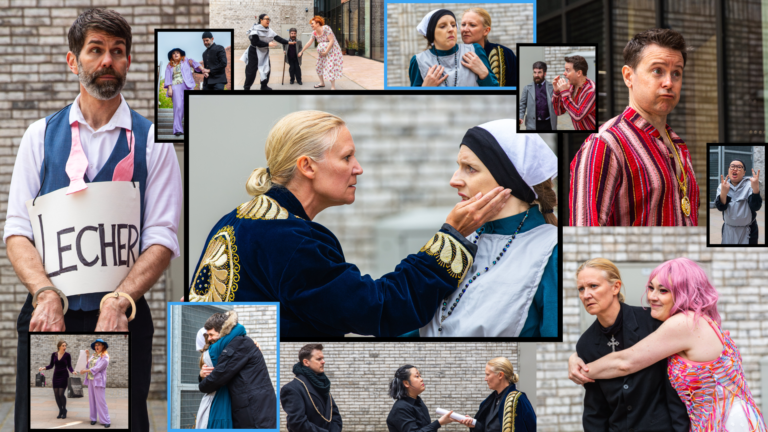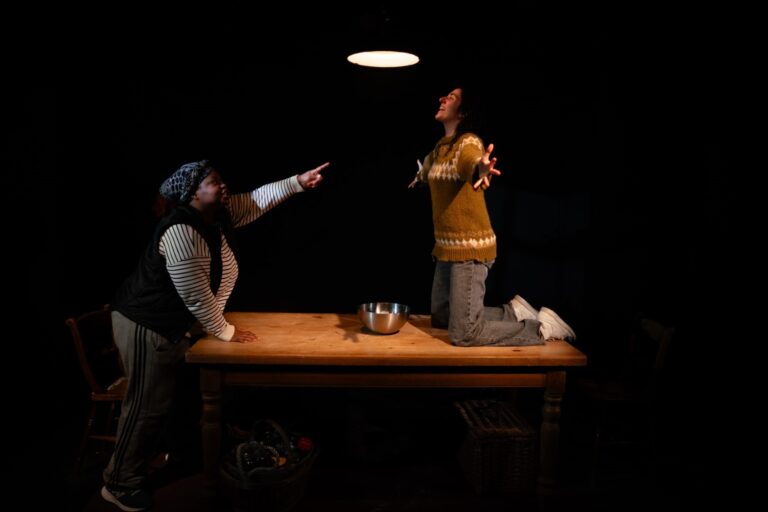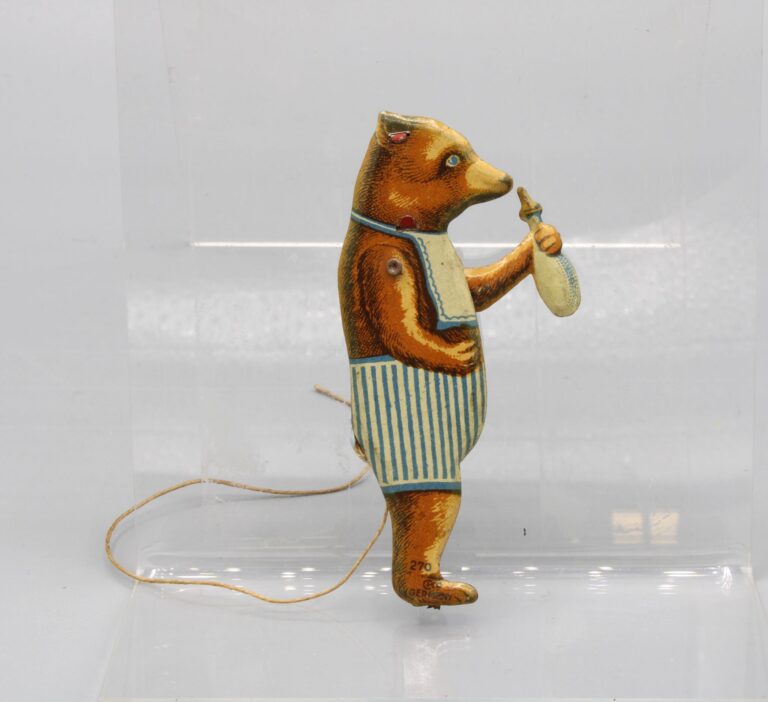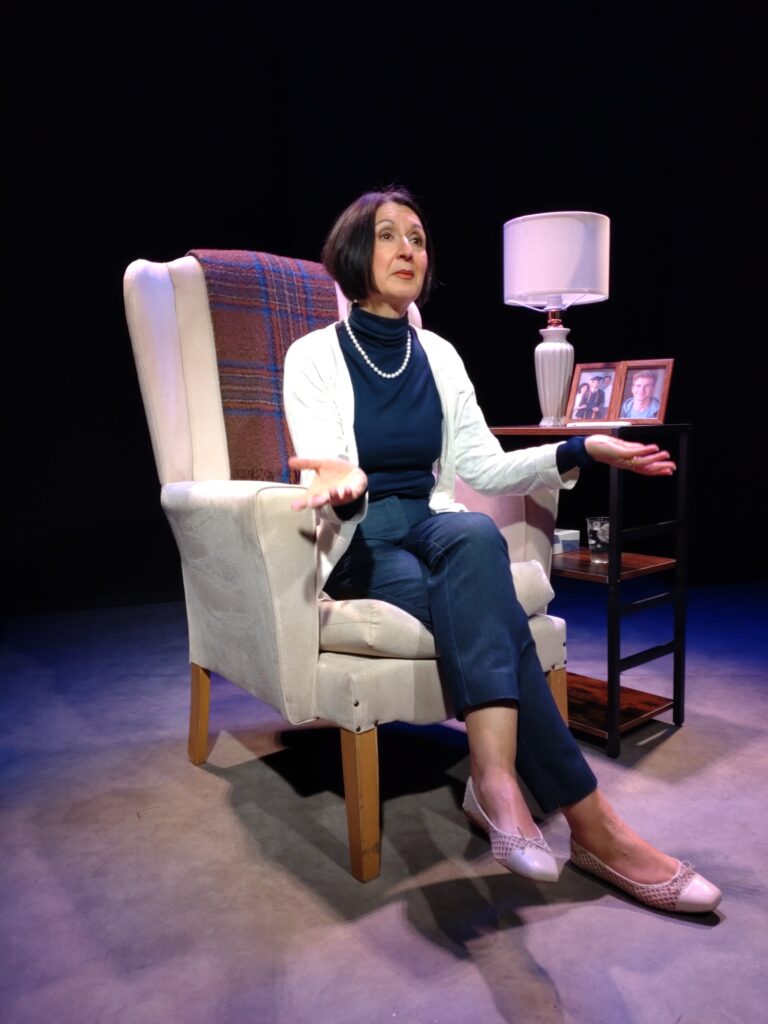A great set shows a valley in County Donegal with a cottage nestling at the bottom and trees that actually shimmer in the breeze and clouds that float across the sky. This is where everything happens to the five isolated and unmarried Mundy sisters. Or where very little happens, writes Michael Holland.
Michael opens Dancing at Lughnasa with a long speech that informs us that this story will be his version – in flashback – a tale that covers the summer of 1936 when Michael was seven.
For the first 40 minutes we listen to the sisters chatting about nothing in particular: two of them run the house(Maggie and Christina); one is a school teacher (Kate) and two work from home knitting gloves (Agnes and Rose). They all help to bring up Michael, as his parents, Gerry and Christina, never married. There is also a rooster that attacks Maggie and a radio that works intermittently and sometimes brings music into the kitchen that allows the girls to express themselves through dance: the younger ones with wild abandon, Maggie like a fun-loving crazy lady, and Kate, like a buttoned-up schoolteacher. But the energetic dancing merely threw a spotlight on how little else they had in their mundane lives.
When Michael’s father Gerry appears there were hopes for some drama, but he came to say he was off to fight for the International Brigade against Franco’s Fascists. Kate pointed out that he was on the side fighting the Catholics but Christina claimed he was fighting to save democracy.
The return from Uganda of their brother Jack, where he has been a missionary for many years, creates some tension but very little. His presence is more gentle comedy than edge-of-your-seat excitement. Father Jack’s mind has been affected by malaria but the other symptoms that manifest themselves are his leanings towards a more African way of living: multiple wives, witch doctors, and pagan ceremonies, which did not go down well with the local religious leaders who refused to let him say mass in the village church.
When a knitwear factory opened in the village I thought that would be the catalyst for protest when Aggie and Rose lose their meagre income, but no. Michael tells us they got jobs there. Talk of Kate losing her teaching job also amounted to nothing.
The rooster mysteriously dies and nobody blames Maggie. Rose goes missing with Daniel for three hours but she doesn’t have to explain. So many moments when some life could be injected into the play, but Brian Friel chooses not to, not even for the sake of dramatic expression. Dancing at Lughnasa started and stopped just like the wireless radio they had.
And then it ended as underwhelmingly as it began, with Michael giving a long speech telling us what happened to his mother, aunts and uncle.
Overall, the play is about changes in Irish society and an attack on the ridiculous restrictions that religion and the church have on people’s lives, and how the younger generation is fighting against it. Gerry will fight Catholics to keep democracy; Father Jack sees more sense in the Ugandan leper colony than in the teachings he had been brainwashed with; Christina and Gerry felt no need to be wed, and there were other hints at sex before marriage in the dialogue.
Dancing at Lughnasa is a nice slice of Irish life but I want more from a visit to the theatre. I don’t want to feel I’ve been stuck in a roomful of my aunts all gossiping. With three actors from Derry Girls and Ardal O’Hanlon a Father Ted legend, I wanted belly laughs. I got chuckles. My companion just wanted the women to stop folding and unfolding towels.
For me, reading the programme on the journey home was much more fulfilling. It was there I found out that Rose had moved to London and died as an inmate of Newington Lodge – ‘a dumping ground for destitute women’ in Westmoreland Road, Walworth, home of Arments, one of my favourite pie-mash shops.
Now that is a play right there.
National Theatre, South Bank, SE1 9PX until May 27th. Times: 7.30pm, Wed & Sat matinees 2pm. Admission: £20 – £86.
Booking: www.nationaltheatre.org.uk






